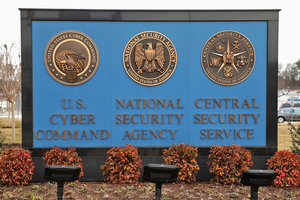FBI failed to access 7,000 encrypted mobile devices
 Christopher Wray said encryption on devices was "a huge, huge problem" for FBI investigations. The agency had failed to access more than half of the devices it targeted in an 11-month period, he said. One cyber-security expert said such encryption was now a "fact of life".
Christopher Wray said encryption on devices was "a huge, huge problem" for FBI investigations. The agency had failed to access more than half of the devices it targeted in an 11-month period, he said. One cyber-security expert said such encryption was now a "fact of life".
Many smartphones encrypt their contents when locked, as standard - a security feature that often prevents even the phones' manufacturers from accessing data. Such encryption is different to end-to-end encryption, which prevents interception of communications on a large scale.
Read moreElite hackers: stealing NSA secrets is ‘child’s play’
 The NSA’s hackers have a problem. Last week, multiple outlets reported that its elite Tailored Access Operations unit—tasked with breaking into foreign networks—suffered another serious data breach.
The NSA’s hackers have a problem. Last week, multiple outlets reported that its elite Tailored Access Operations unit—tasked with breaking into foreign networks—suffered another serious data breach.
The theft of computer code and other material by an employee in 2015 allowed the Russian government to more easily detect U.S. cyber operations. It’s potentially the fourth large-scale incident at the NSA to be revealed in the last five years. Now, sources with direct knowledge of TAO’s security procedures in the recent past tell just how porous some of the defenses were to keep workers from stealing sensitive information.
Read moreRussian hackers reportedly stole NSA cyber defense material
 Russian hackers stole documents detailing how US agencies defend their networks against cyberattacks, how they breach foreign networks and the computer code they use to do so.
Russian hackers stole documents detailing how US agencies defend their networks against cyberattacks, how they breach foreign networks and the computer code they use to do so.
The stolen files were identified through Kaspersky security software used by an NSA contractor that had taken classified material from the NSA and saved it on his computer. The theft, discovered last spring, occurred in 2015 and those familiar with the incident told that having this information could help inform Russian officials how to protect their networks against the NSA and possibly how to break into US networks.
Read moreEquifax breach hit 2.5 million more Americans than first believed

The company said the additional customers were not victims of a new attack but rather victims who the company had not counted before. Equifax hired the forensic security firm Mandiant to investigate the breach, and it finished its report on Sunday. News of the new victims comes on the eve of congressional testimony to be given by Equifax’s former CEO Richard Smith, who will address a House subcommittee on Tuesday. He was forced into retirement last week in the wake of the attack.
Read moreFBI won’t have to reveal details on iPhone hacking tool used in San Bernardino case
 The FBI will not be forced to reveal details of a hacking tool used to break into a terrorist's iPhone, a case that sparked months of legal hostilities between Apple and the US government.
The FBI will not be forced to reveal details of a hacking tool used to break into a terrorist's iPhone, a case that sparked months of legal hostilities between Apple and the US government.
Vice News, USA Today, and the Associated Press filed a Freedom of Information lawsuit to reveal the name of the hacking tool's vendor and its price. The Justice Dept. launched legal action against Apple, which had refused to help unlock the phone, arguing the device's encryption could not be defeated -- even by the company. The FBI later obtained a hacking tool -- details of which the agency wants to keep secret.
Read moreNSA targeted 106,000 foreigners in spy program up for renewal
 The U.S. National Security Agency conducted targeted surveillance over the past year against 106,000 foreigners suspected of being involved in terrorism and other crimes, using powers granted in a controversial section of law that’s set to expire at the end of this year.
The U.S. National Security Agency conducted targeted surveillance over the past year against 106,000 foreigners suspected of being involved in terrorism and other crimes, using powers granted in a controversial section of law that’s set to expire at the end of this year.
The number of foreigners targeted under Section 702 of the Foreign Intelligence Surveillance Act rose from 94,000 in fiscal year 2015, according to U.S. intelligence officials, who asked not to be identified discussing the information. The program lets agencies collect the content of emails and other communications from suspected foreign criminals operating outside the U.S.
Read moreTrump administration orders purge of Kaspersky products from US government
 The Trump administration on Wednesday told U.S. government agencies to remove Kaspersky Lab products from their networks, saying it was concerned the Moscow-based cyber security firm was vulnerable to Kremlin influence and that using its anti-virus software could jeopardize national security.
The Trump administration on Wednesday told U.S. government agencies to remove Kaspersky Lab products from their networks, saying it was concerned the Moscow-based cyber security firm was vulnerable to Kremlin influence and that using its anti-virus software could jeopardize national security.
The decision represents a sharp response to what U.S. intelligence agencies have described as a national security threat posed by Russia in cyberspace, following an election year marred by allegations that Moscow weaponized the internet in an attempt to influence its outcome.
Read moreNSA broke the encryption on file-sharing apps Kazaa and eDonkey
 Before services like Spotify and Netflix proliferated, people who wanted to listen to music or watch movies online, on demand, had few legal options. Instead, they would download copies of pirated media using file-sharing technology.
Before services like Spotify and Netflix proliferated, people who wanted to listen to music or watch movies online, on demand, had few legal options. Instead, they would download copies of pirated media using file-sharing technology.
In early 2004, close to 8 million people in the U.S. alone were estimated to have downloaded music through so-called peer-to-peer apps like LimeWire, eDonkey, Kazaa, and BitTorrent. While it’s difficult to measure exactly how much of the world’s internet traffic consists of people swapping files, at the time some estimates said it was approaching 40 percent.
Read moreSessions, Coats push for permanent renewal of controversial surveillance law
 The nation’s top law enforcement leader and top spy on Monday urged Senate and House leadership to permanently renew a widely used but controversial U.S. surveillance law scheduled to sunset at the end of the year.
The nation’s top law enforcement leader and top spy on Monday urged Senate and House leadership to permanently renew a widely used but controversial U.S. surveillance law scheduled to sunset at the end of the year.
“Reauthorizing this critical authority is the top legislative priority of the Department of Justice and the Intelligence Community,” Attorney General Jeff Sessions and National Intelligence Director Dan Coats wrote in a Sept. 7 letter to both Republican and Democratic leaders. The law — known as Section 702 of a 2008 package of amendments to the Foreign Intelligence Surveillance Act — is aimed at collecting data on foreign spies, terrorists and other targets.
Read moreCIA developing AI that could track your social media posts to gather intelligence
 The CIA is making use of several artificial intelligence programs that access, gather, and retrieve social media intelligence for the agency.
The CIA is making use of several artificial intelligence programs that access, gather, and retrieve social media intelligence for the agency.
In a statement reported by Futurism, Dawn Meyerriecks, the deputy director for technology development with the CIA said at the Intelligence and National Security Summit that the agency had over 137 AI projects as part of "In-Q-Tel" where a large portion of it is created through collaborations with Silicon Valley firms. With greater ability and power to analyse data, AI programs thus created have reportedly taken to social media platforms and "comb through" all public records –all the stuff that is posted by people using social media.
Read moreAxarhöfði 14,
110 Reykjavik, Iceland















